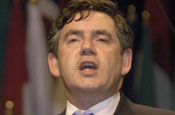Last week's Labour Party conference gave the marketing industry the opportunity to take the political temperature of prime minister Gordon Brown and gauge his government's stance on advertising.
Although speculation about an early election set tongues wagging in Bournemouth, there was also much discussion about the role of advertisers. Major speeches, fringe sessions and evening functions all provided clues as to whether Brown's administration poses a threat or opportunity for marketers.
Brown's upbringing as the son of a Presbyterian minister has emerged as a key motivator, as seen early in his premiership by his U-turn on super-casino policy and the introduction of a 9pm watershed for gambling ads. He trailed his conference speech with interviews espousing a tough stance on underage drinking and reviews of restrictions on the advertising and promotion of alcohol and 24-hour licensing.
In his speech to conference, Brown rounded on the alcohol industry, calling on it to 'do more to advertise the dangers of teenage drinking'. While the new leader's flurry of rhetoric may be genuine, cracking down on perceived vices gives him a chance to win over the middle-Englanders, who, if the Daily Telegraph and Daily Mail are to be believed, are still unsure about Conservative leader David Cameron.
Baroness Buscombe, chief executive of the Advertising Association and a Conservative peer, who attended the conference, told Marketing it is too early to tell whether Brown's government will support the marketing industry. However, Marketing Society chief executive Hugh Burkitt detects a shift in government thinking toward social conservatism - a trend that worries him. 'What most marketers are after is maximum choice and individual freedom,' he says.
On the other side of the fence, Richard Watts, the campaign co-ordinator for the Children's Food 北京赛车pk10 pressure group, has a similar impression of the mood of the conference, though he sees this as reason for cheer. 'There's a sense that this administration is less willing to trust industry to sort out social problems than Blair's. The argument for self-regulation carries less weight,' he says.
Worryingly for marketers, sources with links to Brown's advisers claim he does not feel the need to cozy up to the business world, as he already won it over during his time as Chancellor.
The theme of obesity, especially in children, is still high on the agenda, with ministers from many departments broaching the subject.
Obesity falls under the brief of Dawn Primarolo, the public health minister, who took over from Caroline Flint in June. Primarolo, previously a Treasury minister, appears to have little appetite to join the growing band of detractors who place the blame for the obesity crisis firmly at the door of big food brands. At a series of fringe meetings there was ample opportunity to play to the audience by talking tough on the food industry, but she pointedly avoided doing so.
One of the sessions she attended, entitled 'Weight of obesity: what's the solution?', was hosted by Nestle, a long-time object of hate for many left-wing campaigning groups, in a move aimed at facing down its critics. The company's head of public affairs, Rupert Maitland-Titterton, pushed the point home that 'there really isn't a single big solution to obesity' and highlighted Nestle's efforts to improve its health credentials by reformulating thousands of recipes. He appealed for the government, companies and consumers to work in partnership. 'It's not about blaming each other, it's about working together,' he said.
On the face of it, this approach to combating obesity seems to be the one Primarolo favours. She told Marketing that she felt she had a 'positive relationship' with big food companies and supermarkets and was pleased with how they had responded to the problem. However, she added: 'They have to recognise they have a responsibility; that's not targeting them, that's saying they have a responsibility like the rest of us. They've done some good things, but there's more that everyone can do.'
Primarolo declined to be drawn further, as her department is close to publishing a review on restrictions on food and drink advertising and another on obesity, which should provide a yardstick. 'We hope that when it reports on progress, the government will note the significant changes that have taken place over the past few years in the nature and balance of food and soft-drink advertising,' says Buscombe.
But some Labour figures will never be won over by the industry's arguments. Helen Goodman, deputy leader of the House of Commons, blamed advertising for the 'commercialisation of childhood' in a fringe meeting organised by left-wing think-tank Compass, and is campaigning for a 9pm watershed for 'junk food' advertising.
As Marketing went to press, talk of an early election was escalating. If Brown does take the gamble and call an early poll, subtleties will go out of the window, headlines will be sought, and marketers will be left in no doubt where they stand with Labour and its rival parties.


